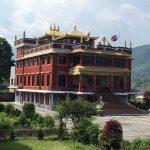The landscape of a seemingly idyllic world surrounds me. Just over the hill, poverty and hardship abound; people do what they can just to get by. Still, they do so smiling. Their warm faces inviting and gentle. Their labor is hard, much of it looks to be back-breaking toil. I see these people, young and old alike, walking slow under heavy burdens uphill for hours while I often struggle with only the weight of my small backpack. I have learned of pain as my aching joints protest another step upwards towards the peaks of Annapurna, my lungs struggling to intake the thin oxygen properly. These hardships seem trivial compared to the stories I have heard.
I met a young woman in Pokhara and she told me her story. She told me of the devastation her village suffered after the earthquake. How, because it was so small, the government gave no aid and destruction remains three years later. She told me how her father was dead, her brother an alcoholic, her sister un-working, her mother swinging wildly between sadness and anger, and of the rape and disrespect that surrounded her and lead her sister to stop working. She recounted a story of a client at the massage place where she worked who tried to solicit her to return to his hotel room with him. When she refused, his simple utterance of “Fuck off!” or “Fuck you!” struck her; she felt guilty. Her story struck me.
I know little of the earthquake and sitting among the terraced slopes of the Nepalese country, I find it hard to imagine this land shaken by destruction. The people here have a great capacity for kindness. The gentle namaste echoing from all sides as one walks through the streets is a calming sound. The people here seem like the gently flowing river before me. They are strong and ever-moving.
Why travel? I can only answer that question for myself. I travel for the people I meet. For the gentle hands of the old Tibetan woman with the lined face who speaks harsh English with a softness behind it. I travel for the small white bird—who reminds me of a little boy that after a brief period of distraction runs with the awkwardness of one who has only just begun to understand his limbs to catch his mother— that walks in the shadow of the water buffalo. The people here are strong like the river who builds her own path. They are like the mountains that surround them on all sides. Their ability to live in such harsh beauty astounds me. Nepal is a landscape of feral beauty, but by far, the people are the most beautiful part. They change the unforgiving landscape into a land which sustains life. Where it thrives.
-Ula, class of 2019
























